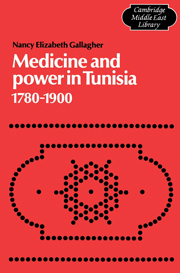Book contents
- Frontmatter
- Contents
- Illustrations
- Acknowledgments
- Note on transliteration
- Abbreviations
- Introduction
- 1 Indigenous medicine against plague, 1780–1830
- 2 Cholera in an age of European economic expansion, 1830–58
- 3 Cholera, typhus, and economic collapse, 1858–70
- 4 Colonization and collapse of Arab medical institutions
- Conclusion
- APPENDIX A Waqf (hubus) document for the maristan of Tunis
- APPENDIX B Letter from Husayn Bey to de Lesseps on reasons for the quarantine
- APPENDIX C Epidemics and population trends
- Notes
- Glossary
- Bibliography
- Index
3 - Cholera, typhus, and economic collapse, 1858–70
Published online by Cambridge University Press: 23 November 2009
- Frontmatter
- Contents
- Illustrations
- Acknowledgments
- Note on transliteration
- Abbreviations
- Introduction
- 1 Indigenous medicine against plague, 1780–1830
- 2 Cholera in an age of European economic expansion, 1830–58
- 3 Cholera, typhus, and economic collapse, 1858–70
- 4 Colonization and collapse of Arab medical institutions
- Conclusion
- APPENDIX A Waqf (hubus) document for the maristan of Tunis
- APPENDIX B Letter from Husayn Bey to de Lesseps on reasons for the quarantine
- APPENDIX C Epidemics and population trends
- Notes
- Glossary
- Bibliography
- Index
Summary
In the 1860s economic, political, social, and ecological crises ricocheted off one another in ominous succession. In the past Tunisia had weathered epidemics but this time new outbreaks of diseases in the context of the existing economic imbalance resulted in permanent damage to the established political order.
The weakness of the economy was exacerbated by new, European-imposed laws that removed the few remaining protections available to Tunisian commercial enterprises. Despite Muhammad Bey's conservatism, European interests in 1857 had induced him to promulgate a new charter, the ‘ahd al-aman (Fundamental Pact). The pact was essentially a bill of rights that was to become the basis of the 1860 constitution. Written by the French consul and rewritten by Bin Diyaf, the document gave Europeans the right to own land, to establish factories, and to practice free commerce. It abolished all legal protection for local products and industries. Rural qadis yielded their customary authority to newly created central criminal and commercial tribunals patterned after those of French civil law. Europeans were henceforth subject to local law, which was rewritten to give equal rights to all religions and nationalities. The consuls retained their extraterritorial rights, however, and continued to grant asylum not only to their conationals but also to Tunisians they chose to protect. The laws were adaptations of the Hatti Humayun and Hatti Sharif (tanzimat) Ottoman reform laws. Muhammad Bey ceremonially signed the pact, encouraged by the presence of a squadron of French and British warships moored off Tunis and Malta.
- Type
- Chapter
- Information
- Medicine and Power in Tunisia, 1780–1900 , pp. 65 - 82Publisher: Cambridge University PressPrint publication year: 1983



